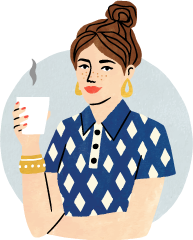Therapists in 196 35

One of the core principles in Cognitive Psychotherapy states that the way in which people understand, explain and conceptualize the problems they suffer in life is itself a big part of those problems. You might be feeling anxiety as a consequence of overthinking, you might be experiencing your mood going down after using certain concepts or words to define yourself, you might be feeling frustrated after a relationship didn't work out as you expected... In all cases your mind plays a main role, and the way how your thoughts connect with your emotions and create certain behaviours forms patterns that we can discuss in a safe space.
One of the core principles in Cognitive Psychotherapy states that the way in which people understand, explain and conceptualize the problems they suffer in life is itself a big part of those problems. You might be feeling anxiety as a consequence of overthinking, you might be experiencing your mood going down after using certain concepts or words to define yourself, you might be feeling frustrated after a relationship didn't work out as you expected... In all cases your mind plays a main role, and the way how your thoughts connect with your emotions and create certain behaviours forms patterns that we can discuss in a safe space.

Alejandra Guadalupe Campastro
Psychotherapist, MA, Socialstyrelsen - Psychotherapist
Verified Verified
196 35 Kungsängen (Online Only)
Consider this: the anxiety you feel may stem from relentless overthinking, while a downturn in mood might follow from the negative concepts or labels you attach to yourself. In every instance, your mind takes center stage. The intricate interplay between your thoughts, emotions, and actions creates patterns that influence your well-being. But fear not, for within these patterns lies the opportunity for growth and change.
Consider this: the anxiety you feel may stem from relentless overthinking, while a downturn in mood might follow from the negative concepts or labels you attach to yourself. In every instance, your mind takes center stage. The intricate interplay between your thoughts, emotions, and actions creates patterns that influence your well-being. But fear not, for within these patterns lies the opportunity for growth and change.
See more therapy options for 196 35
FAQs - About Therapy and Counselling
How can I find a therapist in 196 35?
Search for nearby therapists or counsellors by inputting your city, town, or suburb; or postcode; or a provider’s name into the search bar. From there, you can filter providers by the issues they treat, cost, insurance, gender, and other factors to find providers who are well-suited to your needs. To navigate between locations within the same country, enter a new city or postcode into the search bar.
Learn more about how to find a therapist.
Learn more about how to find a therapist.
Is online therapy a good option?
Therapy conducted online or over the phone can be just as effective as in-person therapy, as long as there is a strong alliance between the client and the therapist. To find a therapist who provides telehealth services to clients in your area, click “Online Therapy” on the directory homepage and search by your city or town or your postcode.
What’s the difference between a psychologist, a therapist, and a counsellor?
Therapists, psychologists, and counsellors are all licensed mental health professionals. In many countries, psychologists have earned a doctoral degree. The terms “therapist” and “counsellor” are used somewhat interchangeably, but generally therapists offer longer-term, mental health care, while counsellors offer shorter-term care that may focus on one domain, such as marriage, career, or academic challenges.
What type of therapist is right for me?
Clients should consider factors such as insurance coverage and their primary reason(s) for seeking therapy to determine the type of professional best suited to their needs. Someone struggling with mental health challenges such as depression or anxiety, for example, may wish to seek out a clinical psychologist or therapist, while someone navigating career obstacles or marital upheaval may benefit from seeing a counsellor who can offer short-term, targeted support.
Is everyone in the Psychology Today Therapy Directory a licensed therapist?
The Psychology Today directory lists providers who offer legitimate mental health services to the public, including psychologists, psychiatrists, social workers, and counselors. Many have been licensed by the country where they practice; providers whose license or primary credential has been verified by Psychology Today are signified by a “Verified” symbol. Some clinicians or organizations provide services for which their state or country does not offer licenses, such as pastoral counselling. They may be selectively included without the “Verified” seal.
What type of therapy is right for me?
The type of therapy best suited to a particular individual depends on several factors, including their primary reason for seeking therapy, their preferred timeline (some therapy types last for a set number of sessions, while others are open-ended), and their personality and preferences—some may prefer a more structured approach. For many individuals, multiple types of therapy could provide a good fit.
Is online therapy cheaper than in-person therapy?
Many therapists charge the same amount for online therapy as they do for in-person therapy—though clients may still find this cost-effective if it cuts down on their transportation costs. Health insurance plans often offer equivalent coverage for online and in-person therapy; indeed, in many places, they are legally required to do so. Text-based or on-demand therapy apps may be cheaper than traditional one-on-one psychotherapy; however, the practice may be less effective and is not likely to be covered by insurance.
